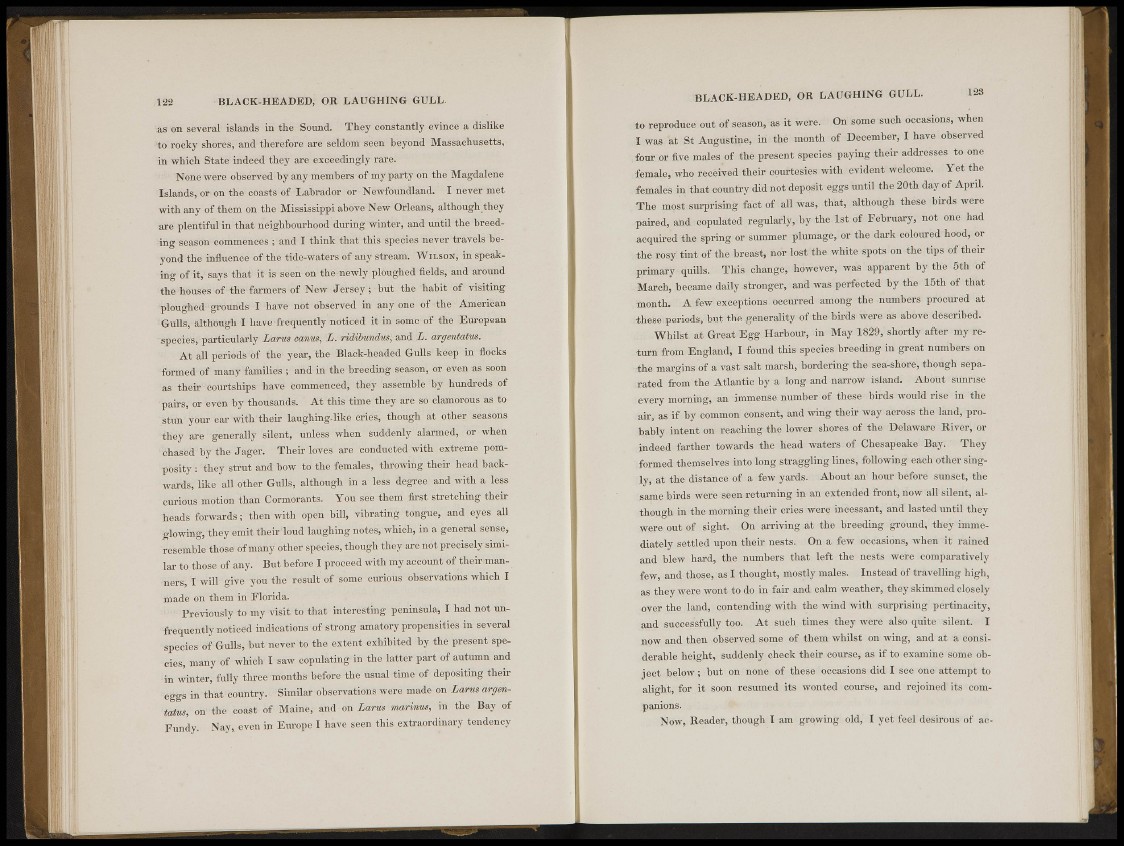
122 BLACK-HEADED, OR LAUGHING «ULI.
;as on several islands in the Sound. They constantly evince a dislike
t o rocky shores; and therefore are seldom seen beyond Massachusetts,
in which State indeed they are exceedingly ran;.
None were observed by any members of tny party on the- Magdalene
Islands, or on the- coasts of Labrador or Newfoundland. I never-met
with any of them on the Mississippi above New Orleans, although they
are plentiful ¡»that neighbourhood during winter, and until the breeding
season commences ; and I think that this species never travels beyond
the influence of the tide-waters of any stream. WILSON, in speaking
of iVsavs that it' is seen on the newly plouglied fields, and around
the houses'of the farmers of New Jersey ; liut the habit of visiting
ploughed grounds I have not observed ¡J? any one •<">{' the American
Gulls, although I have frequently rwrt'iced i't;in*somc of the European
species, particularly 1/arus canw, L. ridibnndm, and L. argmtatw.
At all periods of the1 year, the Blaek-heftded Gulls keep in flocks
formed-of many families ; and in the breeding season, or even as soon
as their"courtships have commenced; they assemble by hundreds of
pairs, or e#n by thousands. ' At tiiis time they are so clamorous as to
stiin your ear with'their laughing-like eric's;'- though at other seasons
th(iy -arfc; generally silent, unless when suddenly alarmed, or when
chased by the Jager. Their loves are conducted with extreme pomposity:
they .strut and bow to tlie'females, throwing their head backwards,
like all other Gulls; although"; in a lefi degree and with a less
curious motion than Cormorants. Y o u ' f i r s t knaffiiliir their
heads forwards; then with open bill, vibrating tongue, and eyes all
glowing, they emit their'loud laughing notes, which, in a general sense,
resemble those of many other specip, though they are not precisely siniilar
to those of any. lint before I proceed with my accountl?ff their man-
I l l s ; I will 'give you the result of SljinV curious* observations which I
made on them'in-Florida.
" Previously'to my visit-to that interesting peninsula, I had not unfrequently
noticed mdications'of strohg amatory propensities in several
spoeicWWGulls, btWnever to the extent exlnbi®l 'by the present species,
many^whi ch I saw copulating in the latter part of autumn and
in winter, fully thj-ee months before-the usual time of depositing their
eggs in that country. . Similar observations were made on Lams aramiatus,
on-tlic coast of Maine, and on Larus mannm, in the Bay of
Fundy. Nay, even in Europe I have .seen this extraordinary tendency
BLACK-HEADED, OR LAUGHING GULL. 123
to, reproduce out, @f season, as it were. : On some such occasions, when
I was at St Augustine, in the month of December, I have observed
four or five males of the present species paying their addresses to one
female," who received their courtesies with evident welcome. Yet the
females in that country did not deposit eggs until the 20th day of April.
The most surprising tact of. : » was, that, -although these birds were
paired, and copulated regularly, by the 1st of February, not one had
acquired the spring or summer plumage, or the dark coloured'hood, or
the rosy tint of the breast, nor lost the white spots on the tips of their
primary »quills. This changes; however, was apparent by the 5th of
-March, became daily stronger, and was perfected by the 15th of that
month. A few exceptions occurred among the .numbers procured at
these periods, but the generality of the-.birds were as above described.
Whilst at Great Egg.Harbour, in May 182^ shortly a f t e rmy return
from England» I found this; species breeding in great numbers on
the margins of a vast salt marsh, bordering the sea-shore, though separated
from the Atlantic by a long and narrow island. About sunrise
every morning, an immense number of those birds would rise in the
air, as if by common consent, and wing their way across the land, probably..
intern, on reaching the lower shores of the Delaware' River, or
•indeed farther towards -the head waters of Chesapeake; Bay. ' They
formed themselves into long straggling lines, following each other singly,
at the distance of a few yards. About an hour before sunset, the
same birds were seen returning in an extended front, how all silent, although
m.the morning their cries were incessant, and lasted until they
were out of sight. On arriving At the breeding ground, they, immediately
settled upon their nests...,, On a few occasions, when " it rained
and blew hard, the numbers that left the nests were comparatively
fevy, and those, a.sl -tho.ug-ht, mostly males. Instead of travelling high,
as they were wont to do in fair and calm weather, they skimmed closely
over the land, contending with the wind with surprising pertinacity,
and successfully too. At stMh,. times they were also quite 'silent. I
now and then observed some of them whilst on wing, and at'ft considerable
height, suddenly check their course, as if to examine some object
below; but on none of these occasions did I see one attempt to
alight, for it soon resumed its wonted course, and rejoined its companions,.
Now, Reader, though I am growing old, I yet feel desirous of ac